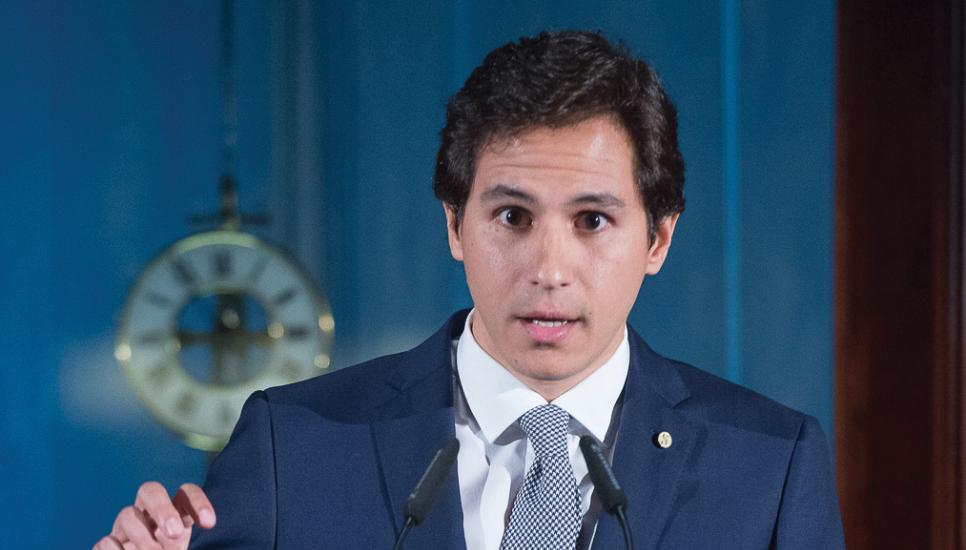Hugo Peris: a sight for sore eyes

After working in the pharmaceuticals industry in China, New Zealand, and Spain, 31-year-old Hugo Peris, a fourth-generation member of Spanish family business Laboratorios Salvat, is embarking on his first independent venture.
When I was a kid I wanted to work in the family business. I remember the first time my parents asked what I wanted to be, and I said I wanted to be the manufacturer of “Cristalmina”, which was our biggest brand at the time. As I got older I started to do my own thing. For a while I was interested in technology and developing websites. It wasn't until university that I rediscovered my interest in pharmaceuticals.
I studied international business in Barcelona. As I was about to finish my degree, I had the chance to go on an internship, which was a requirement of the university. I decided upon New Zealand mainly because it was the furthest place from Barcelona. Luckily, my father had a great connection in the pharmaceutical industry, which allowed me to spend the next six months working in marketing and sales at [Swiss pharmaceutical company] Novartis. After a brief stint in Australia, I moved to Chicago and worked as a sales representative for one of our commercial partners.
-and-Hugo-Peris.jpg) Two years into my US adventure I met a pharmaceuticals executive called Robert Braithwaite (pictured right). He was setting up Luqa Pharmaceuticals, a company designed to commercialise western pharmaceuticals in the Chinese market. I ended up living in China for almost five years. The firm now has a target revenue of $4.5 million for the current financial year. In May 2015 we finalised our Series-A round with Morningside, which is a big family office fund based in Hong Kong, bringing in $15 million. I used that event to step down from my operational role at Luqa.
Two years into my US adventure I met a pharmaceuticals executive called Robert Braithwaite (pictured right). He was setting up Luqa Pharmaceuticals, a company designed to commercialise western pharmaceuticals in the Chinese market. I ended up living in China for almost five years. The firm now has a target revenue of $4.5 million for the current financial year. In May 2015 we finalised our Series-A round with Morningside, which is a big family office fund based in Hong Kong, bringing in $15 million. I used that event to step down from my operational role at Luqa.
I'd already been thinking about my next move and I decided the time was right to start Loop Therapeutics. From my seat at the board of directors of Salvat, I identified a project out of our research and development (R&D) department that looked very exciting but wasn't getting enough attention. The project consisted of two patented molecules that had the potential to prevent cell apoptosis, the process under which cells induce their own death. I suggested spinning out the patents and focusing on developments for corneal diseases, which would allow for a faster and less risky development process. I presented the business plan to the CEO of the company and to my father, who is our president and chairman, and they approved it.
Ophthalmology is an interesting field because there is comparatively less risk in developing products. Because eyes are easy to interact with, products that treat diseases in the surface of the eye are less expensive and faster to develop. Our first product is a solution that will improve the quality of corneal storage during the transplantation process, with the idea of improving the outcome of corneal transplants. Our second product will target Fuch's Dystrophy, a congenital disease of the cornea for which there is no treatment available to date. The third project we are going to develop targets cataract surgery and actually has the most market potential.
I decided to establish Loop Therapeutics in the US because the market rewards innovation. The US is the biggest healthcare market in the world partly because it allows for higher pricing to reward R&D. The availability of talent, the easier access to capital, and a better start-up ecosystem are also important factors that made me decide on the US.
The Chinese pharmaceutical market has changed a lot over the last 20 years. It used to be a market with lots of local companies manufacturing generic versions of western products. The country eventually started to open up and that became a huge opportunity for multinational companies to enter and to grow. China is now one of the strategic markets and one of the biggest earners for most of the largest multinational pharmaceutical companies. The private market is also developing very fast as consumers become more interested in their quality of life. We are also seeing a few truly innovative companies developing new treatments from China.
It's very interesting how the pharmaceutical industry is often portrayed as the bad guy. The first thought is that pharmaceutical companies charge high prices and spend millions to get doctors to prescribe their drugs. But our industry offers huge healthcare benefits and has contributed dramatically to an improved quality of life. Pharmaceutical companies should always behave in the most ethical manner, but R&D is very risky and companies must seek a return on their investment. Today, taking an innovative product to market can cost in excess of $2 billion.
We have a vision for Loop Therapeutics. In two years from now we would like to have our first product on the market. Then we will open the company to external investors, provided they bring strategic value. If things go well, my family will want to keep supporting the project financially. It will also be important to give access to other people or institutions with more experience and a strong vision that can help with our growth strategy. In five years we hope to be profitable.






